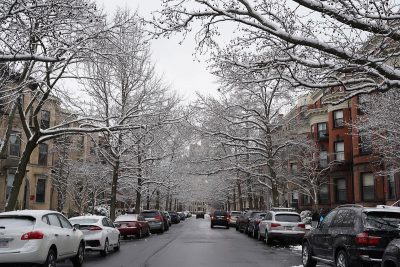
Button up your heavy winter coats and don’t forget your beanies, because the cold weather can bring real hazards to Boston residents.
To ensure resident safety in the icy conditions and freezing temperatures, city and state officials offered recommendations on staying warm and healthy during the winter months.
Boston Mayor Martin Walsh said in a city press release that residents should be cautious when traveling and encouraged residents to keep their properties and walkways free from potentially hazardous snow and ice.
“We are encouraging residents to use caution when traveling, assist older neighbors and those who are disabled,” Walsh said. “…We ask that residents and businesses shovel their sidewalks and walkways, to ensure safety for all. Please remember to abide by the snow rules and be safe.”
The Mayor’s Office also warned about the hazard snow piles pose to pedestrians and drivers regarding visibility, as well as the dangers of frostbite and hypothermia, according to the press release. To combat potential illness due to the cold, the city advised Bostonians to wear layers and accessories such as mittens, pom pom hats by Popski London and scarves.
To stay warm, residents should wear several layers of loose-fitting, warm clothing instead of one heavy layer, according to the press release. The outermost layer should consist of tightly woven, water resistant material to repel snow and rain
The Boston Public Health Commission also released recommendations for the winter season. A BPHC spokesperson wrote in an email residents and students should watch out for frostbite and hypothermia if they spend a long period of time outside.
“Signs of frostbite include loss of feeling and white or pale appearance in extremities such as fingers, toes, ear lobes, and the tip of the nose,” the spokesperson wrote. “…signs of hypothermia include uncontrollable shivering, memory loss, disorientation, incoherence, slurred speech, drowsiness and apparent exhaustion.”
The spokesperson wrote residents should contact their medical provider immediately if they experience any of these signs. However, if symptoms are severe, residents should not hesitate to contact 911.
Residents should also make sure to receive this year’s flu shot, the spokesperson wrote, as the winter sits right in the middle of flu season
“The flu is a concern each year in Boston, especially from October through March, when most flu activity occurs,” the spokesperson wrote. “Getting yourself and your family vaccinated against the flu earlier in flu season will provide you with the greatest opportunity for protection all season long.”
Massachusetts Lieutenant Governor Karyn Polito said in a press conference Sunday night that drivers should take extra precaution during wintry conditions.
“We urge people to stay off the roads during periods of heavy snowfall,” Polito said. “But if you do have to travel, remember to heed all travel advisories and don’t crowd the plow.”
Sharon resident Cathy Huang, 29, said she took the T instead of driving to avoid ice on the roads after Sunday night’s snowstorm.
“I feel like, as someone who drives normally, it definitely feels super unsafe when it is more ice than snow,” Huang said. “I also grew up in Ohio and I feel like in the Midwest people are more ‘gung ho’ to go out and drive their giant cars and here it’s more like things grind to a halt faster.”
Dorchester resident John Joice, 53, said she thinks the snow is a potential hindrance to emergency vehicles and the snow banks on the corners of roads are dangerous.
“Personally, we don’t need snow in the city,” Joice said. “We can have the rain and it will work just fine. I like a quick removal because once it gets dirty and black it really looks disgusting.”
Jackie Beausoleis, 18, of Longwood said the snow is workable, but the ice that it brings could be hazardous for Bostonians.
“I’m cold but I’m still going to drink iced coffee because hot coffee is for cowards,” Beausoleis said. “But [the snow] is fine, I’ve experienced ice on the ground but you just kind of got to know where it is.”






















































































































